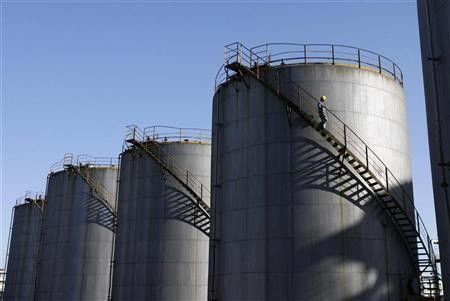S.Sudan Firm on Oil Marketing, Selling 200,000 bpd

South Sudan's oil ministry said that foreign oil companies and potential buyers of its crude were on notice that no other nation or entity had been authorised to sell its oil.
The oil official responsible told Reuters last week that South Sudan will market its crude through the ministry, casting further doubt on the role trading major Glencore's GLEN.L venture will have in selling the nation's oil.
The ministry has also informed all foreign oil companies and potential buyers of South Sudan crude oil that no other nation or entity has been authorized to sell its oil, the ministry said in a statement on Monday.
All are on notice that if they purchase any South Sudan crude oil that has been expropriated or otherwise placed on the market by any other institution without South Sudan's consent, they will be held accountable and their future relations with South Sudan will be jeopardized.
South Sudan declared independence on July 9 under a 2005 peace deal that ended decades of civil war with the north. It took about 75 percent of the united country's roughly 500,000 barrels of oil per day with it when it seceded.
To export crude, South Sudan must pump it through pipelines that run north through Sudan to a Red Sea port. The two countries have still not agreed how much South Sudan should pay as a transit fee.
The ministry also said a decision to transfer shares owned by Sudan's state oil firm Sudapet in consortia in South Sudan to Nilepet was a legitimate act of sovereignty that had already been agreed with Sudan in pre-secession talks.
Sudan's foreign ministry has called on Juba to reconsider a presidential decree transferring the shares.
NEW REFINERY
South Sudan sold 33.4 million barrels of oil (around 200,000 barrels per day) for $3.2 billion for the period between July 9 and December 31 this year, and was also assessing the feasibility of building a new refinery and cross-border pipeline.
The ministry said it had taken steps to purchase a micro refinery for South Sudan and to establish a petroleum infrastructure development team of ministry representatives and advisers that would assess the feasibility of building a larger refinery in South Sudan and a new trans-boundary pipeline.
Within the next few weeks South Sudan will send officials to its neighbouring countries that have proposed cross-border pipeline arrangements with South Sudan, it said, adding it was also discussing building new processing facilities to improve oil recovery in existing wells.
South Sudan has repeatedly threatened to build an alternative pipeline, but analysts say this has little prospect of becoming viable in the foreseeable future because it requires fresh oil finds and an end to unrest in oil-producing areas.
The petroleum and mining ministry's Undersecretary Macar Aciek Ader told Reuters on Thursday that South Sudan was pumping about 365,000 barrels per day, although challenges such as a lack of manpower were affecting output.
The country sold 7.2 million barrels of Nile Blend for $800 million from its Unity state blocks and 26.2 million barrels of Dar Blend for $2.4 billion from its Upper Nile state blocks, the ministry statement said.
Sudan pulled out hundreds of oil workers at independence, leaving just a fraction of the expatriate workers and a handful of South Sudanese to run South Sudan's oil fields.
South Sudan is battling rebel militias in both its Upper Nile and Unity states, but analysts say the violence is unlikely to seriously hamper oil production in the near term.
The ministry said it will publish all information and data related to production, sales, prices, revenues, destinations and companies operating in the oil trade quarterly.
© Copyright Thomson Reuters 2024. All rights reserved.





















